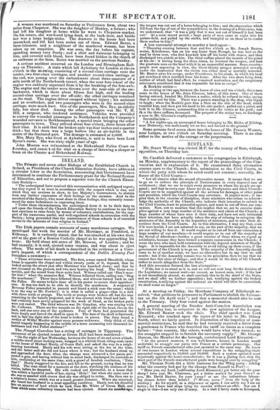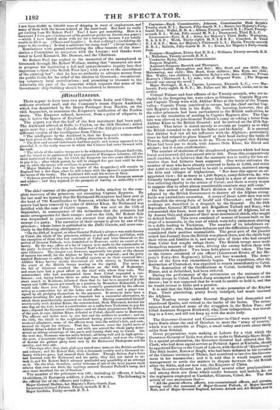SCOTLAND.
Mr. Stuart Wortley was elected M.P. for the county of Bute, without opposition, on Thursday last.
Dr. Candlish delivered a statement to his congregation in Edinburgh, on Monday, supplementary to the report of the proceedings of the Con- vocation and in explanation of it. He enumerated three alternative courses open to the Church : first, submission to the Civil Courts, to which the party with whom he acted could not consent ; secondly, de- fiance of the Civil Courts-
" Let all observe what the second alternative means. It means that we are to go on to enforce the principle of Nonintrusion in every disputed case of settlement ; that we are to reject every presentee to whom the people are op- posed ; and that in every case where we do so, Presbyteries and other Church- ' Courts are to be supported against all the actions for damages, or other pains and penalties, which the Civil Courts may entertain. It implies more ; it im- plies that, in the exercise of discipline, those ministers who refuse to acknow- ledge the authority of the Church, who indicate their intention to submit to the Civil Courts, must be proceeded against, and must be cut off from our con- nexion. Now, not to mention that this implies that we are to exercise disci- pline against a very large number of the ministers and elders of the Church; a large number of whom have seen it their duty, and have not only intimated their intention, but have actually taken the step of refusing to recognize the sentences of the Assembly in the deposition of ministers, and to take their di- rections from the Civil Courts. As to this alternative, I may say that, even if it were lawful, I am not ashamed to say, on the part of the majority, that we are not willing to face it. It would require us to cut off from our connexion a large number of our members—it would require us to cut off the majority of the Synod of Aberdeen—besides a great number of those whom we regard, as schismatic, because they have formed a separate communion in the Church ; I mean the men who have held communion with the deposed ministers of Strath- bogie. It is impossible for the Assembly to avoid taking up these cases, if the government of the Church is to go on. If the majority of the Assembly should come to be of another mind, we have no alternative but to say that we will secede : but if the Assembly remain true to its principles, then we say that we cannot face this state of things ; and that it would be the duty of the Church rather to secede altogether from the State."
And this secession formed the last alternative-
" If the law is to stand as it is, and we will not wait long for the decision of the Legislature, we cannot wait—we cannot, as honest men, wait : if the law is not immediately altered, we shall conclude this to be the mind of the State, and we shall offer no further opposition ; but, testifying against the broken constitution, testifying against the national sin which will then be committed, we shall resist no longer."
At a meeting on Friday, the Merchant Company of Edinburgh re- solved, " that petitions be presented to Parliament to abolish the Income- tax on the 5th April next "; and that a memorial should also be sent to the Treasury. Only four voted against the motion.
A general meeting of the Dundee Anti-Corn-law Association was held on Friday last, to cooperate in the new agitation of the League. Mr. Edward Baxter took the chair. The chief speaker was Lord Kinnaird ; who touched upon the topics of his letter to Mr. Sidney Smith, which we lately quoted. In illustration of the impolicy of com- mercial restrictions, he said that he had recently received a letter from a gentleman in France who described the tariff on linens as a complete failure : " that country, like others, would have what they wanted; so the smuggler stepped in to furnish the necessary supply." Mr. George Duncan, the Member for the borough, corroborated Lord Kinnaird-
" At the present moment, it was well-known, houses in London would undertake to smuggle our yarns into France at a certain percentage. Our tariff on French-manufactured silks just operated in the same way. He knew of two houses in London whose annual expenditure in the smuggling-trade amounted respectively to 13,0000. and 10,0001. Such a system operated most injuriously against the home-manufacture; for it was a glaring fact, that the most part of the French-manufactured goods were brought over by smuggling." Mr. Thomas Neish did a little business for the Whig party : asking what the country had got by the change from Russell to Peel?— "Have you, my Lord, (addressing Lord Kinnaird,) got better sale for your sheep ? have you, Mr. Chairman, got a better market for your linens ? or you, Mr. David Baxter, for your yarns ? or are the industrious labour- ing classes better than before? (" Worse, worse r .(roni the body of the meeting.) As for myself, as a shipowner or agent, I can safely say I am no better; for I have had ships lying for months without an offer. Nor am I single in this-1 am only one of many. in a visit I lately made to Liverpool, I saw from 80,000 to 100.000 tons of shipping in want of employment, and many of them with the broom hoisted at the mast-head. But have we really got nothing from Sir Robert Peel? Yes! I have got something. Here is a document I have got—(taking out of his greatcoat-pocket an Income-tax paper) —which 1 have carried about with me for a fortnight, because I am totally unable to fill it up. (Cheers and laughter.) Is that nothing?—(exhibiting the paper to the fleeting.) Is that a substitute for cheap food? (Great laughter.)
Resolutions were passed constituting the office-bearers of the Asso- ciation a Committee to cooperate with the League ; and thanks were voted to Lord Kinnaird, Mr. Duncan, and the Chairman.
Sir Robert Peel has replied to the memorial of the unemployed at Greenock through Mr. Robert Wallace, stating that "measures are now in progress for instituting a full and comprehensive inquiry into that important subject [the Scotch Poor-law] with a view to the amendment of the existing law "; that he has no authority to advance money from the public funds for the relief of the distress in Greenock ; recommend- ing voluntary local contributions ; and promising to transmit to the Admiralty the part of the memorial which requests that some of the Government ship-building should be transferred to Greenock.



























 Previous page
Previous page